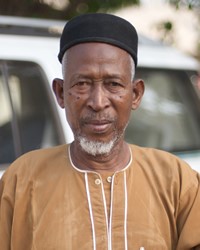The Susu are a group of farmers, merchants, and fishermen who can be found primarily in Guinea, West Africa. The Susu are descendants of the thirteenth century Mali Empire. They moved to their present location after 1725, when the Fulani attempted to dominate them and managed to convert them to Islam.
Their language, called Soso or Susu, serves as a major trade language in the region and is almost indistinguishable from the language of the Yalunka. Because of these linguistic similarities, some people think that at one time the Susu and Yalunka were one group, living in the Fouta Djallon ("Middle Guinea") region. It is thought that Fula invaders separated the two groups, with the Susu moving southward and absorbing other peoples in the process.
The Susu people are especially numerous in Guinea, but they also live in other West African countries including Gambia.
The Susu are primarily farmers, with rice and millet being their two principal crops. Mangoes, pineapples, and coconuts are also grown. The women make various kinds of palm oil from palm nuts. They also make peanut oil and soap. All of the family members, including the children, are expected to do their share of the manual labor necessary for sustaining an adequate lifestyle.
In addition to farming, fishing and salt production are important enterprises to the Susu economy. Salt is produced during the dry season, and it can take up to three months of intense work to produce anything substantial. The Susu are also well known as merchants and craftsmen of leather and metal.
Susu houses are typically made of either mud or cement blocks, depending on the resources available. They are generally quite large in order to accommodate extended families. In the cities, roofs are most often made of corrugated iron; whereas in the rural areas, they are usually still made of thatch. Most cooking is done over open fires. Electricity is available in many places, but clean water is generally lacking. Humanitarian aid organizations are trying to help the Susu by digging wells throughout the area.
Although they can buy Western clothes in the markets, most Susu women seem to prefer African dress. They usually wear African-style skirts that reach to their ankles. Older men wear loose-fitting cotton robes, but the younger men prefer Western-style clothing.
The extended family is very important in Susu society. Polygyny (having more than one wife) is allowed under Islamic law, but it is only practiced by those who can afford it. Although good relationships are valued, there are many conflicts with neighbors, especially when dealing with money or property. Thus, each village usually has its own "wise man," as well as an elected or appointed leader to help resolve conflicts.
The Friday meeting at the mosque remains an important social event for most Susu. There is some indication that the young men are perhaps growing disillusioned with both Islam and socialistic ideas. Today, many of them are moving to the cities, where they have been plagued with poverty and idleness.
They believe that ghosts, spirits and gods all inhabit the same land, and that witches have the power to change into animals and cause harm to their villages.
The Susu of Gambia are largely Muslim, and Islam dominates their religious culture and practices. They observe most Islamic holidays, the most important being the celebration that follows Ramadan (a month of prayer and fasting). They also continue to practice their traditional ethnic religions.
Because of a history of Christianity in West Africa, the Susu have been somewhat evangelized. The New Testament is available in the Soso language, but there are only a few known Susu believers in this region. Prayer is the key to effectively reaching them with the gospel.
Pray for the Lord to raise up a strong disciple making movement to saturate the hearts and minds of the Susu people.
Pray for God's blessing, strengthening and healing of Susu families and communities through the abundant life Jesus offers to all who call on His name.
Pray for God's blessing on Susu leaders, along with their families, and for their communities to welcome and enjoy God's blessing.
Pray for the Lord to multiply the reception and influence of His Word among the Susu people, leading them to love Him with their whole being.
Scripture Prayers for the Susu in Gambia.
https://joshuaproject.net/people_groups/15141/GA
https://joshuaproject.net/people_groups/15141/SG
https://www.britannica.com/topic/Susu
https://en.wikipedia.org/wiki/Susu_people
| Profile Source: Keith Carey |











